Parents and Music Education: Supportive Involvement
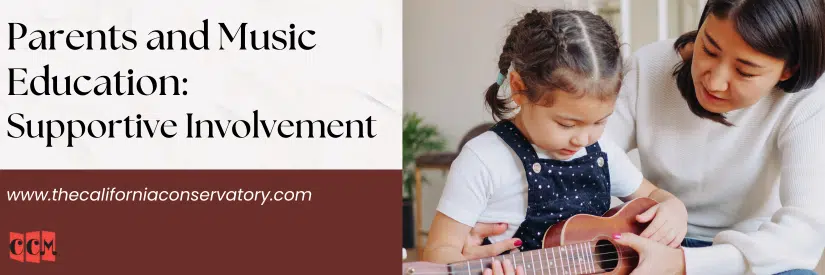
When a child begins their musical journey, the guidance and encouragement from parents often determine their success. While teachers provide expert instruction and structure, it’s the parents who help establish practice routines, reinforce learning, and support their child’s emotional connection to music. The relationship between parents and music education is a critical factor that influences not only progress but long-term enjoyment and commitment. At The California Conservatory of Music (CCM), we believe that music education flourishes most when families are actively involved. Whether you’re new to music lessons or already enrolled, understanding your role can help you make the most of your child’s musical experience.
Why Parents Matter in Music Education
The phrase “parents and music education” often evokes images of attending recitals or cheering from the sidelines. But the role is far more impactful than that. Children who know their parents are invested in their progress tend to be more motivated and consistent in their practice. They feel supported and accountable. This kind of engagement has been shown to boost retention and confidence in young musicians.
Parents also bridge the gap between the lesson room and home. Most students only see their teacher once a week, so parents become an extension of that learning environment. From ensuring the instrument is cared for, to gently reminding kids to practice, your influence is foundational. Instructors at CCM appreciate when parents are engaged, because it allows for more fluid communication and collaborative goal setting for the student.
Early Involvement: The Suzuki Approach for Guitar
For very young learners, parental participation becomes even more hands-on. At CCM, our guitar students aged 3–4 follow the Suzuki method. A key part of this approach includes a “parent education” phase, where the parent actually attends and participates in the first three lessons. This is more than observation—it’s a training period for the parent to learn how to assist with at-home practice.
This requirement exists because, at this age, students cannot manage their learning alone. They need an adult to help them hold the instrument properly, repeat teacher instructions, and turn practice into a positive, daily habit. By getting involved early, parents gain a better understanding of the technical and emotional needs of their young musicians. It creates a team dynamic that benefits both the teacher and the child.
Practical Ways Parents Can Support at Home
If you’re wondering how to be involved without stepping on toes, here are some practical suggestions. These are especially helpful during the first few years of lessons, when building habits matters most.
Create a consistent practice schedule: Even 10–15 minutes daily can lead to substantial progress.
Set up a quiet, dedicated practice space: Avoid distractions and make the area comfortable and inspiring.
Use positive reinforcement: Celebrate small wins, like completing a song or remembering a tricky fingering.
Check in with the teacher: A quick email or end-of-lesson chat can keep you aligned with lesson goals.
Stay informed with tools like Practice Space: Many teachers at CCM use Practice Space, an app that tracks assignments, logs practice time, and communicates between teachers and families.
The more parents engage with their child’s progress, the more likely the student will stick with lessons long-term.
Encouragement vs. Pressure: Finding the Right Balance
One of the biggest concerns in parents and music education is finding the line between encouraging and pressuring. It’s natural to want your child to excel, but too much pressure can lead to anxiety or burnout. The goal is to foster a love of music, not just proficiency.
Try to focus on effort over perfection. When your child puts in the time to practice—even if the song doesn’t sound perfect—acknowledge the dedication. Avoid phrases like “You should be better by now” and instead say things like “I’m proud of how hard you’re working.”
Additionally, remember that progress in music isn’t always linear. There will be bursts of improvement followed by plateaus. Staying patient and keeping the mood light at home can make a big difference. At CCM, teachers will guide both the student and parent through these ups and downs with customized instruction and encouragement.
Making the Most of Recitals and Community Events
Another important part of parents and music education is showing up for performances. CCM holds bi-annual recitals at the Mountain View Center for the Performing Arts, giving students the opportunity to perform in a professional venue. These events are free for families and optional for students, but highly encouraged.
Performances allow children to work toward a goal, develop stage confidence, and learn how to handle nerves. Parents play a big part by attending, recording videos, and cheering loudly from the audience.
We also host smaller performances in community settings like retirement homes and local festivals. These events help students connect their music with real people, and parents often help coordinate logistics, transportation, or snacks. It’s another great example of how parents can turn music education into a shared family experience.
Music Education Support System for Parents
At The California Conservatory of Music, we want parents to feel supported, not overwhelmed. That’s why we maintain open lines of communication between teachers and families. If a student is struggling to practice, we’re happy to offer strategies and adjustments. If a parent wants to get more involved, we’ll find ways to include them meaningfully.
We also offer resources like:
Digital practice logs and assignments
Monthly newsletters with tips and student highlights
Blogs like this one to guide you on your journey
Our faculty is professionally experienced not only in music, but in working with children and families. We know that no two students—or parents—are the same. Flexibility and empathy are core to our teaching model.
Final Thoughts: Parents and Music Education
In the end, parents and music education go hand in hand. When families are involved in the learning process, students are more motivated, practice more consistently, and enjoy music on a deeper level. Whether you’re attending recitals, helping with homework, or just listening to your child play in the living room, you are making a lasting impact.
Music lessons offer more than just notes and rhythms—they teach discipline, patience, expression, and resilience. With your encouragement and CCM’s expert instruction, your child can build a lifelong love for music and carry the benefits into every other area of life.
If you’re considering enrolling your child in lessons, know that your role is valued and essential. And if you’re already part of the CCM family, thank you for everything you do. Together, we can create an environment where music thrives—in our classrooms, in your home, and in your child’s heart.
Sign up for your FREE music lesson at The California Conservatory of Music today!

Nicola Benedetti: June Musician of the Month
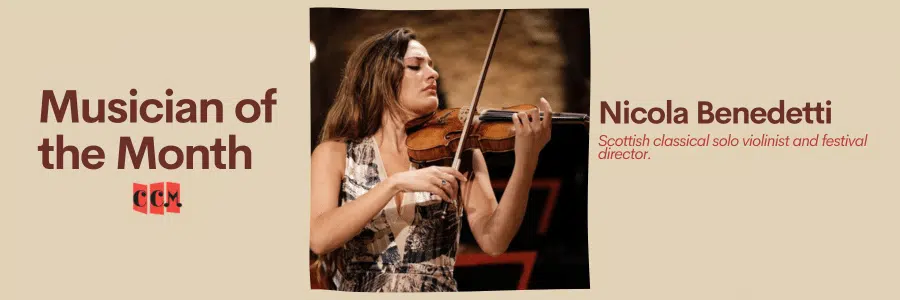
Nicola Benedetti has become one of the most prominent classical musicians of her generation. Benedetti’s musical journey has inspired young musicians around the world. She has shown that talent, dedication, and education go hand in hand. Moreover, she proves that music can change lives and strengthen communities.
Early Life and Inspirations
Nicola Benedetti was born in 1987 in West Kilbride, Scotland. She began playing the violin at the age of four. Her early passion for music was nurtured by supportive parents and skilled teachers. At age ten, she was accepted into the Yehudi Menuhin School, where she studied under renowned instructors. There, she developed a strong foundation in technique and musicality. She often credits her time at the Menuhin School as being pivotal in shaping her musical identity.
Nicola Benedetti’s Music Career
Nicola’s professional career took off after winning the BBC Young Musician of the Year Award in 2004. This achievement launched her into international fame. Since then, she has performed with leading orchestras across Europe, Asia, and the United States. She is known for her rich tone, expressive phrasing, and commanding stage presence. Additionally, her recordings have topped classical music charts and earned critical acclaim.
Unique Musical Aspects
Benedetti is known for her versatility in programming and her thoughtful interpretations. She often combines classical staples with contemporary works. She has also premiered new pieces by living composers. This blend of old and new shows her commitment to keeping classical music relevant. Furthermore, she plays a 1717 Gariel Stradivarius violin, which adds a unique timbre to her sound.
Benedetti’s Notable Recordings
Some of Benedetti’s most recognized recordings include concertos by Tchaikovsky, Bruch, and Szymanowski. She also recorded “Homecoming,” an album that explores Scottish musical traditions. Her album “The Benedetti Sessions” showcases her passion for music education and collaboration. Moreover, she has championed underrepresented composers and brought attention to lesser-known works. Her performance of Wynton Marsalis’s Violin Concerto was especially groundbreaking.
Final Thoughts
Nicola Benedetti exemplifies what it means to be a modern classical musician. She is not only an exceptional performer but also a dedicated educator and advocate. Her work bridges generations and musical boundaries. At The California Conservatory of Music, we celebrate her achievements and draw inspiration from her journey. Students and families alike can learn from her dedication to music and community!
Sign up for a FREE music lesson at The California Conservatory of Music today!

Silvestre Revueltas: June Composer of the Month
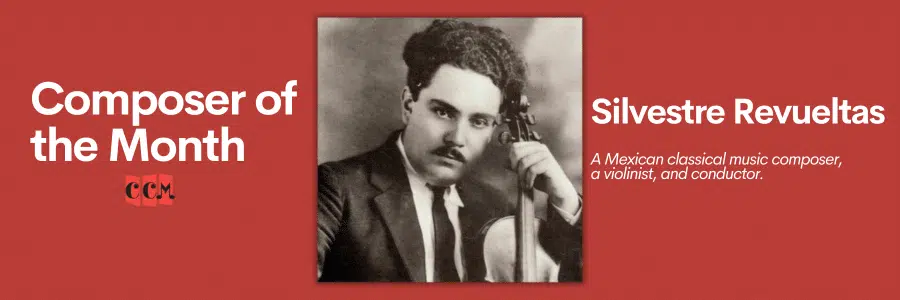
Silvestre Revueltas remains one of the most compelling figures in Mexican classical music. His compositions are bold, evocative, and deeply rooted in the cultural and political landscape of early 20th-century Mexico. With a style that blends modernist techniques with folk-inspired rhythms, Revueltas helped shape a distinctly Mexican sound in classical music. His music stands as a testament to the power of national identity expressed through art. This month, we explore his life, music, and enduring legacy.
Early Life and Inspirations
Silvestre Revueltas was born on December 31, 1899, in Santiago Papasquiaro, Durango, Mexico. He grew up in a household surrounded by the arts—his siblings included painters, writers, and actors. This artistic environment shaped his curiosity and encouraged his musical ambitions from a young age. His early music education took place in Mexico, but he later studied at the Conservatorio Nacional de Música and then abroad at the St. Edward’s University in Texas and the Chicago College of Music.
During his time in the United States, Revueltas absorbed modernist influences and became increasingly drawn to contemporary trends in European classical music. Yet, he never lost touch with his Mexican heritage. The sounds of village festivals, street musicians, and indigenous rituals stayed with him and would later inspire much of his compositional voice. His experiences as both a Mexican citizen and a global artist gave him a unique vantage point for musical expression.
Silvestre Revueltas’ Music Career
Revueltas returned to Mexico in the late 1920s and soon became involved in the country’s growing cultural renaissance. In 1929, he was invited by composer Carlos Chávez to become assistant conductor of the Orquesta Sinfónica de México. This partnership gave him opportunities to showcase his own compositions and champion works by other Mexican composers. Revueltas quickly emerged as a prominent voice in national music circles.
His work during this period included concert music, film scores, and music for political events. He had a remarkable ability to move between these forms while keeping his signature style intact. Revueltas also worked as a professor at the National Conservatory and influenced many younger musicians. He became known not just as a composer, but also as a passionate advocate for the role of music in society.
However, Revueltas’s relationship with Chávez eventually became strained, leading him to part ways with the orchestra. Still, he continued composing prolifically and took on independent projects, including music for revolutionary films and performances supporting workers’ movements. These projects reflected his strong leftist political beliefs and commitment to the Mexican people.
Musical Style and Innovation
Silvestre Revueltas developed a unique compositional voice that defied easy categorization. His music often includes irregular rhythms, layered textures, and vivid contrasts in tone. He drew inspiration from the sounds of daily life in Mexico, incorporating everything from mariachi-style melodies to birdcalls and street rhythms. These elements gave his work a raw, earthy quality that connected deeply with audiences.
One of his trademarks was the ability to evoke specific places or feelings using only instrumental color and rhythm. Revueltas often used dissonance and asymmetry not to create chaos, but to reflect the complexity and energy of Mexican life. He was particularly skilled at writing for small ensembles, producing works that were both compact and richly expressive.
Moreover, his compositions frequently include references to indigenous and mestizo musical traditions, though never in a purely imitative way. Instead, Revueltas absorbed these influences and transformed them through a modernist lens. This fusion created a dynamic new language in Mexican classical music and set his work apart from his peers.
Revueltas’ Notable Works and Themes
One of Silvestre Revueltas’s most famous compositions is Sensemayá (1938), a powerful orchestral piece based on a poem by Cuban writer Nicolás Guillén. The work uses layered rhythms and dissonant harmonies to evoke the ritualistic killing of a snake. Sensemayá is often hailed as one of the most important Latin American orchestral works of the 20th century. Its hypnotic energy and striking use of percussion have made it a staple in concert halls around the world.
Another standout is La noche de los mayas (1939), originally composed as a film score. Revueltas later adapted the music for concert performance, and it has since become one of his most performed pieces. The score captures the spirit of pre-Hispanic culture while using contemporary orchestration techniques. It is both a tribute to Mexico’s ancient heritage and a statement of modern national pride.
His chamber works also deserve attention, particularly Homenaje a Federico García Lorca (1936), written in memory of the Spanish poet. This piece showcases his ability to create deeply emotional music with minimal resources. It combines the somber mood of mourning with flashes of folkloric brightness, offering a layered portrait of loss and hope.
Other notable compositions include Redes (1935), another film score that gained popularity on its own, and Cuauhnáhuac (1931), an orchestral piece that paints a vibrant musical picture of the Mexican landscape. Through all his works, Revueltas consistently demonstrated a deep connection to place, people, and social struggle.
Revueltas’ Legacy and Final Years
Silvestre Revueltas’s life was tragically short—he died of pneumonia and complications related to alcoholism in 1940, at the age of 40. Despite his brief career, he left behind a body of work that continues to inspire musicians and audiences alike. His music remains a powerful expression of Mexican identity and artistic innovation.
Although his fame was somewhat overshadowed by Carlos Chávez during his lifetime, Revueltas has gained increasing recognition in recent decades. Scholars, conductors, and composers have all highlighted the originality and emotional force of his music. His compositions are now regularly performed across the globe, and his name stands among the great figures of 20th-century music.
Today, Revueltas is celebrated not only for his artistic achievements but also for his dedication to social justice and cultural authenticity. His music continues to speak to listeners across generations, reminding us of the beauty and complexity of Mexican life. At The California Conservatory of Music, we honor Silvestre Revueltas for the depth, honesty, and vibrancy he brought to the world of classical music.
Final Thoughts
Silvestre Revueltas remains a towering figure in Mexican classical music. His life and work show how art can reflect and shape national identity. From his early influences and international education to his groundbreaking compositions and cultural activism, Revueltas exemplifies the power of music to inspire and connect.
By blending modernist techniques with folk traditions, he created a musical language that was both deeply personal and widely accessible. His compositions continue to captivate audiences and challenge performers. Revueltas’s legacy reminds us that music is not just entertainment—it is a vital part of our shared human experience.
As we celebrate Silvestre Revueltas this month, we invite our students, families, and community members to explore his works and learn more about his life. Whether you’re hearing Sensemayá for the first time or revisiting La noche de los mayas, we hope his music leaves a lasting impression and sparks new inspiration. At CCM, we are proud to honor composers like Revueltas who use music to make a meaningful difference in the world.
Sign up for a FREE music lesson at The California Conservatory of Music!

Piano Student of the Month: Ryan Miansari
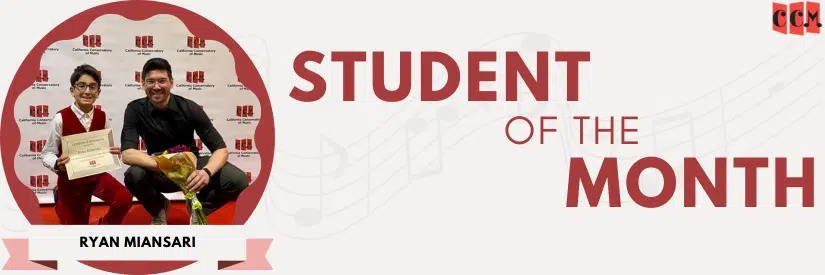
This May, we are thrilled to highlight CCM piano student Ryan Miansari for Student of the Month! Ryan has been taking piano lessons for just over 2 years now at CCM and currently studies with Teacher Sean at our Redwood City location. Teacher Sean says, “Ryan is a consistently hard-working student. He comes into each and every lesson well prepared and with an amazing, upbeat attitude. He has an incredible attention to detail and a strong sense of musicality.”
Way to go, Ryan!
Student of the Month Questionnaire – Ryan Miansari
What is your name?
My name is Ryan.
How old are you?
I’m 10 years old.
Who is your teacher?
Mr. Sean is my teacher, and he’s amazing! He makes learning fun and always believes in me. I’ve learned so much from him!
How long have you been taking piano lessons?
I’ve been learning piano for 2 years.
What advice would you give to a piano student just starting at CCM?
Don’t give up easily. Keep practicing, the days when you’ll play beautiful songs are coming soon.
What piece are you looking forward to learning someday?
I’m really looking forward to learning ‘The Pink Panther’ and ‘Coffin Dance’ someday, both are so fun and have amazing rhythms!
What is your favorite thing about playing piano?
My favorite thing about playing piano is the peaceful feeling it brings ,it’s like giving love to each note and letting the song come alive.
What is your favorite food?
My favorite foods are tacos and pizza, and I love ice cream too.
Do you have a pet?
Yes! I have 10 fish, 2 snails, and one ghost shrimp in my aquarium. They’re fun to watch
Do you play any sports or do any other activities outside of music lessons?
Yes, I play badminton and soccer. I also love painting, and I’ve even painted a few artworks myself!
What do you want to be when you grow up?
I don’t know yet. I’m still exploring to find something amazing that’s just right for me.
What is your most memorable experience at CCM?
My most memorable experience at CCM was when I completed the 100 Days Challenge for the first time and earned my very first trophy!
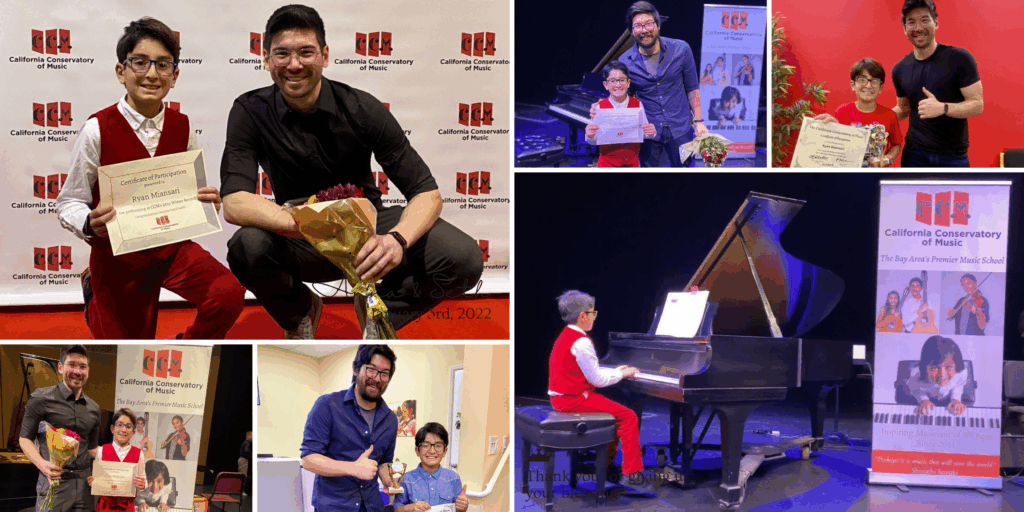
Parent Spotlight – Negin and Morteza Miansari
We’re incredibly proud of how far Ryan has come with the piano. He’s shown so much dedication, and watching him play songs with more confidence and passion is truly rewarding. What makes it even more special is how much more patient he’s become throughout his journey.
Our advice would be to stay patient and supportive. Learning music takes time, and every little step counts. Encourage your child to have fun with the process and not just focus on the end result. A positive attitude and regular practice will make all the difference!
We decided to give Ryan a musical upbringing because we believe music helps build creativity, patience, and discipline. It’s not just about playing an instrument, but also about expressing emotions and growing in confidence. We wanted to offer him the chance to grow through music.
Check out Ryan’s recent recital performance below!
Celebrating CCM Students: Regular Music Practice

At The California Conservatory of Music (CCM), we believe that regular music practice builds more than musical skills—it builds confidence, discipline, and joy. Over the years, we’ve seen countless students grow not only as musicians but as motivated, hardworking individuals. In this blog, we’re proud to celebrate our students’ incredible accomplishments in consistent practice!
Why Regular Music Practice Matters
Regular music practice is the key to progress. It helps students build technical skills, deepen their understanding of their instrument, and prepare for recitals with confidence. Just like brushing your teeth or doing homework, practicing an instrument is most effective when it becomes a part of your daily routine.
Moreover, regular music practice teaches kids essential life skills. It cultivates patience, perseverance, time management, and problem-solving. These benefits extend far beyond music and into every area of their lives—from school to sports to personal relationships. When students learn to stay consistent with their practice, they discover what it means to work toward a long-term goal and enjoy the reward of their effort.
How CCM Encourages Music Practice
At CCM, we know that motivating students to practice daily can be a challenge. That’s why we’ve created a range of fun and effective tools to encourage regular music practice in ways that are rewarding and easy to follow.
1. Practice Streak Rewards
One of the most popular practice incentives at CCM is our streak-based reward system. Students who build streaks of daily practice are recognized with medals and certificates for their dedication. Whether a student hits one month, one year, or even six years of daily practice, their efforts are celebrated by their teacher and our community.
When students reach big milestones, their names are highlighted on our practice plaque ‘Wall of Fame’ and/or on social media, giving them an extra sense of pride. These public celebrations motivate other students and families and create a culture of encouragement and goal-setting.
2. Homework Sheets and Practice Points
Another tool we use is our weekly practice point system. Teachers assign students four tasks to work on throughout the week—these might include a new piece, scale, or theory exercise. Each task is placed in a column labeled with the days of the week.
Every day a student completes a task, they check it off. The more they practice, the more points they earn. If they bring their sheet back with at least 35 points, they earn a small prize. If they reach 170 points over four consecutive weeks, they receive a $5 Jamba Juice gift card!
This approach builds motivation by making practice tangible and rewarding, especially for younger students who love seeing their progress add up.
3. The Practice Space App
We also offer free access to the Practice Space app, a digital tool designed to track and enhance regular music practice. Through the app, students receive weekly assignments and reminders, can check off completed items, and even send practice recordings to their teacher.
The app makes practicing more interactive and accessible for tech-savvy students and helps busy parents stay in the loop. It’s a great way to keep students on track between lessons and add a fun digital component to their learning routine.

Celebrating Student Successes
CCM students have achieved incredible milestones through regular music practice. Their consistency is inspiring and proof that dedication pays off. We’d love to take a moment to spotlight some of these amazing young musicians.
Ayansh & Arika – 4 Years of Daily Practice
Ayansh and Arika, have been taking guitar lessons at CCM for four years—and they’ve practiced every single day! That’s over 1,400 days of showing up for their music and putting in the time. Their journey is a testament to the power of routine and the joy that comes from seeing growth over time.
Ilan – 3 Years and Counting
Ilan has also achieved something remarkable: three full years of daily guitar practice. He’s now well on his way to hitting the four-year mark. His consistency has made a noticeable impact on his playing, and his commitment continues to grow with every lesson.
Charles – 2-Year Streak
Charles recently celebrated his second year of consistent daily guitar practice. His progress has been impressive, and his commitment to regular music practice sets an excellent example for his peers. We’re proud to support students like Charles who keep showing up, even when it’s tough.
Aidan & Ray – 3 and 6 Years
Siblings Aidan and Ray have both reached incredible practice milestones. Aidan has completed three years of daily practice, and Ray has completed an astonishing six years. Their dedication is a true achievement and a perfect example of how music can become part of a family’s lifestyle.
What Parents Are Saying
Many parents tell us that these practice incentives have transformed their child’s relationship with music. They no longer need to be reminded to practice because they’re excited to stay on track themselves.
They’ve also shared that regular music practice has helped their children improve focus, handle frustration more effectively, and feel proud of their accomplishments. When kids feel motivated and supported, their progress becomes something they own and enjoy, not just something they’re told to do.
How You Can Support Regular Music Practice at Home
If you’re a parent thinking about enrolling your child in music lessons—or if you already have and are wondering how to support them—here are a few tips:
Create a consistent time and space for practice. Even 15 minutes a day makes a big difference when it’s done consistently.
Celebrate progress. Whether it’s a new piece learned or a practice streak reached, take time to acknowledge effort.
Use tools like the Practice Space app or weekly point sheets to stay involved and keep things fun.
Communicate with your child’s teacher. They can offer ideas and adjustments to keep practice engaging and productive.
Remember, the goal isn’t perfection—it’s building a habit that helps your child grow.
Final Thoughts
At The California Conservatory of Music, we don’t just teach music—we help students build habits that set them up for long-term success. Through fun, structured practice incentives, we’re proud to see students of all ages develop their skills, confidence, and love for music.
From the first few weeks of lessons to celebrating a six-year streak, every student at CCM has the potential to succeed with regular music practice. We’re here to support every step of the journey—and we’re thrilled to celebrate the amazing dedication of our students and families.
If you’re ready to help your child build a lasting love of music, CCM is the perfect place to begin. Reach out today to schedule a free introductory lesson and see how we can support your child’s musical journey, one practice session at a time.

Yo-Yo Ma: May Musician of the Month
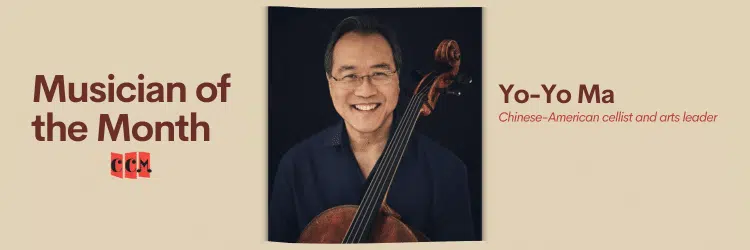
Few names in the classical music world are as instantly recognizable as Yo-Yo Ma. His musical career has spanned decades, genres, and continents. More than just a celebrated cellist, Ma is a cultural ambassador who has combined musical traditions with compassion and creativity. Through performance, education, and outreach, he continues to inspire audiences of all ages. At The California Conservatory of Music, we are thrilled to honor him as our May Musician of the Month.
Early Life and Inspirations
Yo-Yo Ma was born on October 7, 1955, in Paris, France, to Chinese parents. His father, a music professor, and his mother, a singer, immersed him in music from an early age. By age four, Ma began studying the cello, and his prodigious talent quickly emerged. When he was just seven years old, his family moved to New York City, where he enrolled at the Juilliard School to further his training.
Ma’s early inspirations included Johann Sebastian Bach and Pablo Casals. He admired how they conveyed deep emotion through structure and clarity. These influences shaped his style and musical curiosity. Even as a young performer, he viewed music as a way to express stories, emotions, and ideas. This foundation would become essential in his expansive and emotionally resonant career.
Ma’s Music Career
Ma gave his first public performance at age five and was soon recognized as a child prodigy. By age eight, he performed for Presidents Dwight Eisenhower and John F. Kennedy. As a teenager, he appeared on national television with composer Leonard Bernstein. After studying at Harvard University, Ma began performing with major orchestras around the world.
Throughout the 1980s and 1990s, he released a wide array of acclaimed recordings. His interpretations of the Bach Cello Suites, in particular, received universal praise. These pieces became synonymous with his name and revealed the emotional depth and nuance he could bring to classical repertoire. He continued to tour internationally, performing with orchestras, chamber ensembles, and as a soloist.
Ma’s career has never stood still. In addition to classical works, he explored jazz, bluegrass, tango, and world music. His openness to collaboration set him apart from many other classical musicians. He worked with artists like Bobby McFerrin, Edgar Meyer, and Chris Thile. Each partnership reflected his desire to break boundaries and connect through music.
Unique Aspects of His Music
Yo-Yo Ma is not only a brilliant cellist but also a visionary artist. He believes music can connect people across cultures and experiences. This belief led to the creation of his Silk Road Ensemble. The project brought together musicians from countries along the historical Silk Road trade route. It celebrated cultural exchange and collaboration across borders.
His tone is widely regarded as warm, rich, and deeply expressive. Ma is a master of phrasing, capable of conveying subtle emotions with ease. He brings fresh perspectives to familiar works, never performing them the same way twice. His technical skill is matched by his artistic sensitivity. He often says that listening is as important as playing.
Additionally, Ma’s performances reflect joy, curiosity, and presence. He often smiles while playing, and his connection to the music feels authentic and human. He believes that music has a role in healing and building empathy. These values guide both his performance choices and his philanthropic work.
Ma’s Notable Works and Themes
Ma’s recording of the six Bach Cello Suites is among the most famous in classical music history. He has recorded them multiple times, each version reflecting new insights and interpretations. These works showcase the full expressive potential of the cello and Ma’s evolving artistry.
Another key project is his work with the Silk Road Ensemble. Albums like Sing Me Home explore global music traditions with contemporary sensibility. The ensemble’s performances include instruments like the pipa, kamancheh, and shakuhachi. These collaborations highlight the universality of music and Ma’s commitment to community engagement opportunities.
Ma also explored American roots music through his collaborations on Appalachian Journey and Songs of Joy and Peace. These albums combine classical technique with folk traditions. They demonstrate how music can cross genres without losing its soul. His partnership with Kathryn Stott on piano has resulted in many beautiful duo recordings, including pieces by Dvořák, Fauré, and Piazzolla.
A powerful example of his outreach is the Bach Project, a global tour where he performed all six Bach Cello Suites in 36 locations. Each performance was paired with community events promoting culture and civic engagement. The project underscored his belief in the cello as a tool for connection, not just performance.
Final Thoughts
Yo-Yo Ma is more than a master musician. He is an advocate for compassion, creativity, and connection. His legacy stretches far beyond concert halls. Whether playing for world leaders or in community centers, he brings the same warmth and integrity to each performance. At CCM, we admire his commitment to lifelong learning and his passion for making music accessible.
Through his career, Ma has shown that music is not confined by genre, geography, or tradition. His journey reminds us that music can open hearts and foster understanding. As we honor him this month, we hope his story inspires our students and families to listen more deeply, practice with intention, and find joy in their musical journey.
Sign up for your FREE introductory lesson at The California Conservatory of Music!

Reena Esmail: May Composer of the Month
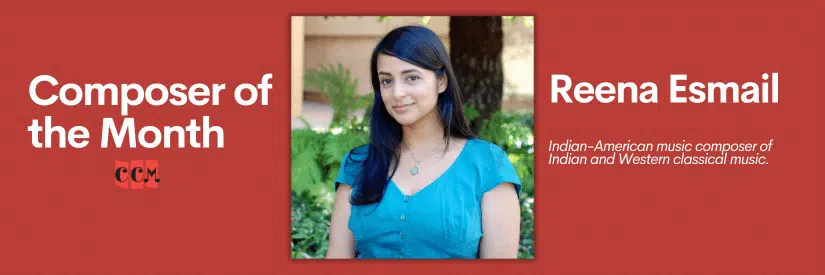
Reena Esmail, an influential figure in contemporary classical music, beautifully bridges Eastern and Western musical traditions. Her work is a testament to the power of music as a universal language. Esmail’s compositions are celebrated for their emotional depth and innovative integration of Indian classical music with traditional Western forms.
Early Life and Inspirations
Born to Indian immigrants, Esmail grew up in a culturally rich environment that nurtured her musical talents. From a young age, she was exposed to both Western classical music and the ragas of Indian classical music. This dual exposure laid the foundation for her unique musical voice. Inspired by composers like Ravi Shankar and Philip Glass, Esmail explored the interplay between these diverse musical languages.
Esmail’s Music Career
Esmail’s studied at prestigious institutions like Juilliard and Yale School of Music, where she honed her skills in Western classical composition. Her career took a significant turn when she received a Fulbright grant to study Hindustani classical music in India. This experience deepened her understanding and appreciation of her cultural heritage, which profoundly influenced her compositional style.
Unique Musical Aspects
Esmail’s compositions stand out for their seamless fusion of the intricate melodic structures of Indian music with the harmonic framework of Western classical music. She often incorporates traditional Indian instruments like the sitar and tabla into orchestral settings, creating a fascinating dialogue between the two worlds. Her approach enriches the musical experience and serves as a bridge between different musical traditions and audiences.
Esmail’s Notable Works and Themes
Among Esmail’s notable works are the “Concerto for Tabla and Orchestra,” which showcases her skill in blending Indian percussion with Western symphonic traditions, and “This Love Between Us: Prayers for Unity,” which explores themes of unity and brotherhood through texts from seven major religious traditions of India. These compositions reflect her deep commitment to using music as a means to foster understanding and connection.
Concluding Thoughts
Reena Esmail’s contributions to the world of music are profound. Through her compositions, she not only showcases the richness of her cultural heritage but also pushes the boundaries of classical music to embrace and celebrate diversity. Her work encourages listeners to think beyond conventional boundaries and appreciate the beauty of a more interconnected world.
Sign up for a FREE lesson at The California Conservatory of Music today!

Guitar Student of the Month: Anderson Moy
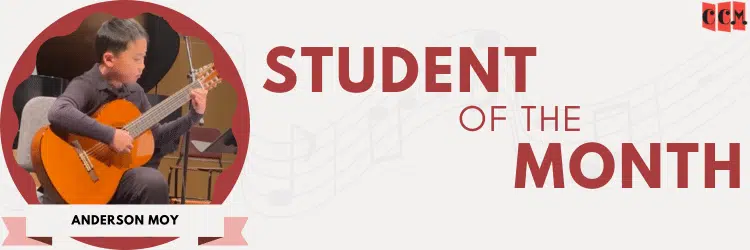
This April, we’re honored to highlight CCM guitar student, Anderson Moy, for Student of the Month! Anderson has been taking guitar lessons for 3 years now at CCM and currently studies with Teacher Matt at our Sunnyvale location. Anderson has become a wonderfully talented musician! Teacher Matt says, “He has taken a big step in the last month or so by taking care of learning the basic notes and rhythms to his pieces on his own so that we are able to dig deeper into his pieces to bring out more subtle, musical details. He is not only able to respond to musical suggestions, but he has begun to work together with me in making musical decisions, suggesting things like his own crescendos in places or chosing what type of character to assign to a specific passage. Outside of lessons, Anderson does a great job of working on specific details from his weekly goals sheets, too.”
Student of the Month Questionnaire – Anderson Moy
What is your name?
Anderson Moy
How old are you?
10
Who is your teacher?
Ive had 3 main teachers at CCM – Teacher Sebastian, Teacher Carlos, and now Teacher Matt
How long have you been taking guitar lessons?
I started learning over zoom in 2021 and then I joined CCM in 2022.
What advice would you give to a guitar student just starting at CCM?
It’s ok to try out different teachers because they have different styles. It’s a helpful way to find a good teacher that suits you.
What piece are you looking forward to learning someday?
-Heartbeats by Jose Gonzalez (because my mom likes that song).
-Hey there Delilah by Plain White T’s.
-Also I liked Malagueña I played a few months ago but want to learn the harder version.
What is your favorite thing about playing guitar?
It’s relaxing, fun, and a great workout for my fingers. I also feel calm after I practice.
What is your favorite food?
Musubi, pizza, fried rice.
Do you have a pet?
No
Do you play any sports or do any other activities outside of music lessons?
Yes- I do breakdancing and hip hop dance, I am on a competitive swim team, I play basketball, and I like to solve rubix cubes.
What do you want to be when you grow up?
I want to be an engineer
What is your most memorable experience at CCM?
Playing in a CCM recital where my good friend Jinu and my little brother Adrian also played!
Check out Anderson’s recital performance here!
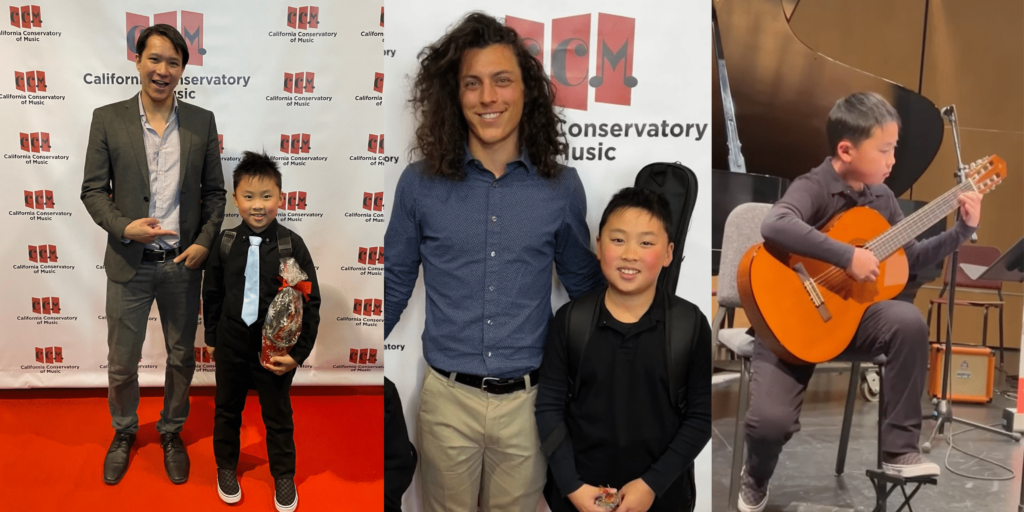
Parent Spotlight – Elaine Lu
I am so proud that Anderson worked hard and was self motivated to learn how to read notes (in treble clef) as opposed to tabs which a former teacher started teaching him. I am also very impressed with Anderson’s enjoyment of recital performances! He enjoys sharing with others what he has worked hard on and feels a sense of accomplishment
I personally wanted to learn a bit of guitar myself so I followed alongside Anderson in the beginning and I think that helped keep him motivated to practice and keep learning since we did it together. He has of course surpassed me long ago, but I would recommend if you can and have the time to sit down in lessons to follow along with what is being taught. You can then reinforce things at home in between lessons!
I grew up around music taught from an early age by my mom who was a piano teacher. I later switched to a stringed instrument and have had my most meaningful and memorable experiences when I was part of a youth symphony. I am hoping to instill the love of music in my son now and I think it will always be a source of creativity, artistic expression, and a source of personal identity/self-confidence.

Joshua Bell: April Musician of the Month
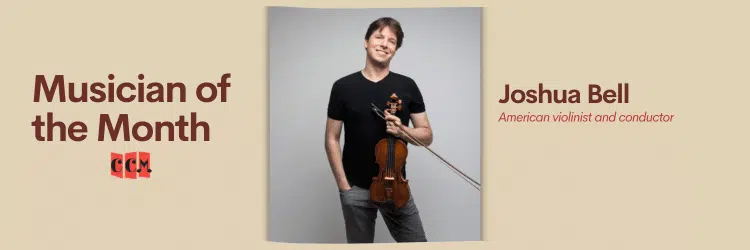
Joshua Bell stands among the most celebrated violinists of his era, acclaimed for his captivating performances and technical finesse. From child prodigy to a luminary on the global stage, Bell’s journey reflects a life dedicated to his craft. This blog explores his inspiring journey, highlighting how his early beginnings shaped a career that continues to influence classical music.
Early Life and Inspirations
Born in Bloomington, Indiana, Joshua Bell exhibited musical talent from an incredibly young age. Bell received his first violin at four years old after his parents noticed him plucking rubber bands stretched across his dresser handles. He was soon studying with Mimi Zweig, then with Josef Gingold, a distinguished violin teacher who nurtured his burgeoning talent. These formative years laid the foundation for his deep-rooted passion for music, heavily influenced by the rich, resonant sounds of classical masterpieces and his mentors’ rigorous training methods.
Bell’s Music Career
Joshua Bell’s professional debut was nothing short of prodigious, performing with the Philadelphia Orchestra at the age of fourteen. His recording career began at eighteen, leading to a Grammy Award-winning discography that spans over 40 albums. Bell’s style is renowned for its blend of virtuosity and poise, which has captivated audiences worldwide. As a soloist, chamber musician, and conductor, Bell continues to mesmerize music lovers, performing more than 200 concerts a year. His career has not only been a journey through diverse musical styles and periods but also a testament to his role as an ambassador for classical music.
Unique Musical Aspects
Known for his versatility, Bell has ventured beyond classical boundaries, collaborating with artists in genres ranging from bluegrass to jazz. He utilizes a range of Stradivarius violins, most notably the Gibson ex Huberman, which produces a powerful, unique sound that has become a hallmark of his performances. His approach to music is also deeply intellectual, often reflecting on the historical context of the pieces he performs, which enriches his interpretations.
Bell’s Notable Works and Themes
Bell’s repertoire is as expansive as it is prestigious. He features works by virtuoso violin composers like Wieniawski, Brahms, and Paganini, alongside contemporary compositions tailored for him. Highlights of his career include performances at Carnegie Hall and the Vienna Philharmonic. He also had an impromptu performance in a Washington D.C. subway station, which later became a social experiment about perception and beauty. His work on film scores, most notably for “The Red Violin,” earned a Grammy Award, further cementing his influence beyond the classical music sphere.
Final Thoughts
Joshua Bell’s enduring influence in the world of classical music is undeniable. Through his performances, recordings, and personal engagements, he continues to inspire a new generation of musicians and music lovers alike. His journey reflects exceptional talent and a continuous quest for deeper musical expression and connection. As we continue to witness his evolution as an artist, his legacy offers a window into the transcendent power of music to touch hearts and minds across diverse landscapes.
Joshua Bell’s story is more than a chronicle of musical achievements; it is a narrative of relentless dedication, perpetual growth, and boundless curiosity. He remains a beacon for aspiring musicians, proving that with passion and perseverance, the language of music knows no bounds.
Sign up for a FREE introductory music lesson at The California Conservatory of Music!

Community Engagement Opportunities at CCM
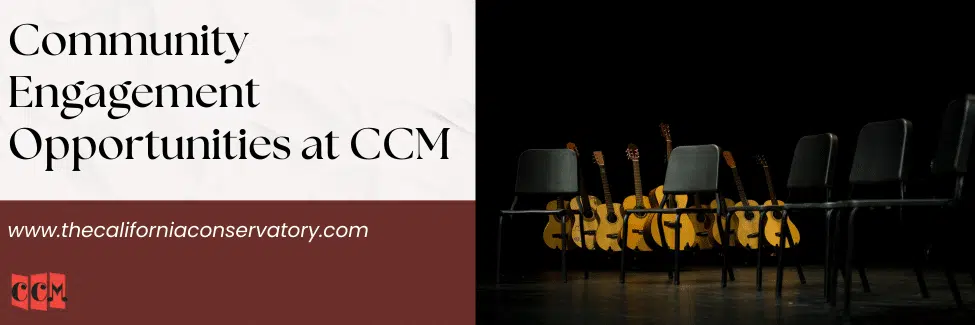
At The California Conservatory of Music (CCM), music lessons extend beyond individual achievement to foster a vibrant community. We understand that music is a powerful tool for community engagement, bringing people together to share, learn, and grow together.
Building Connections Through Bi-Annual Recitals
Twice a year, CCM showcases student talent through recitals held at the Mountain View Center for the Performing Arts. These events are not just performances but celebrations of collective achievement and milestones. They offer students a platform to share their progress and families a chance to connect, fostering a supportive network that feels more like a family.
Group Classes: A Symphony of Collaboration
CCM’s group classes for violin and guitar are designed to enhance skills and to build camaraderie among students. Our ‘Music in Me’ introduction to music class for 3-4 year olds serves as an early exposure to musical collaboration, teaching young children the joys of making music together. These classes lay the groundwork for lifelong friendships and a deep sense of community belonging.
Community Engagement Performances
Our commitment to community engagement extends beyond our classrooms and recital halls. CCM students perform at local events and retirement homes, bringing joy and music to a broader audience. These performances are not only opportunities for students to practice their skills in real-world settings but also powerful moments of connection and service to the community.
The Impact of Community Engagement Opportunities
Community engagement opportunities at CCM help students understand the impact of their music beyond personal achievement. Through this, students learn the value of interacting with your neighbors, enhancing personal development and strengthening community bonds.
Concluding Thoughts
At CCM, music lessons are a gateway to building a vibrant, supportive, and interconnected community. Through recitals, group classes, and community performances, we nurture musical talents and foster a spirit of togetherness and mutual support. Join us to experience how music can not only enrich your child’s life but also bring people together.
By integrating community-building activities, CCM educates young musicians and prepares them to be active, empathetic members of their communities. Whether it’s through sharing a stage at a recital, collaborating in a group class, or performing for local residents, our students learn that their music can resonate far beyond the notes they play.
Sign up for a FREE introductory lesson at The California Conservatory of Music!

